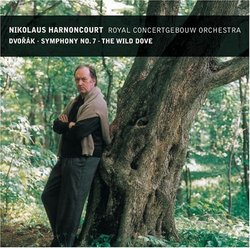| All Artists: Antonin Dvorak, Nikolaus Harnoncourt, Royal Concertgebouw Orchestra Title: Dvorak: Symphony No7; Wild Dove Op110 Members Wishing: 0 Total Copies: 0 Label: Warner Classics Release Date: 11/17/1998 Genre: Classical Styles: Forms & Genres, Theatrical, Incidental & Program Music, Symphonies Number of Discs: 1 SwapaCD Credits: 1 UPC: 639842127820 |
Search - Antonin Dvorak, Nikolaus Harnoncourt, Royal Concertgebouw Orchestra :: Dvorak: Symphony No7; Wild Dove Op110
 | Antonin Dvorak, Nikolaus Harnoncourt, Royal Concertgebouw Orchestra Dvorak: Symphony No7; Wild Dove Op110 Genre: Classical
|
Larger Image |
CD Details |
CD ReviewsA fresh look at much played works J. Buxton | Waltham, MA United States | 07/27/2001 (4 out of 5 stars) "First let me say Harnoncourt's fresh outlooks on Dvorak's final three symphonies with the Concertgebouw are consistently a revelation and very welcome releases. The Seventh, like all three symphonies, was recorded live in Amsterdam in a warm acoustic. Of the many versions of this symphony I own, I don't believe I've heard the first movement performed so well. There seems to be just the right balance between the brass and strings and the building tension is palpable. Also, similar to Harnoncourt's Beethoven recordings, the details and the textures are brought out vividly and so you are allowed to hear things perhaps you haven't noticed before. The moment of climax in the first movement really sounds like a climax. I have one reservation about Harnoncourt's Dvorak and I admit it is probably a very personal preference. He insists on a "period-informed" method of bowing on the strings, perhaps a holdover from his days conducting Bach. What I mean by this is the strings are told to use very little, if any, vibrato in their playing. For me I notice this brings a thin sort of detached sound from the violins which may be appropriate in Bach or Mozart, but is this appropriate for Dvorak's more romantic approach? I'm sure Mr. Harnoncourt knows more about this than I, but I simply prefer a more full string sound as in the Szell, Kertesz, Kubelik, and Dohnanyi versions of the Seventh. The place I notice this the most is in the second theme of the Finale of the Seventh where I am expecting to hear the violins singing out but here they seem somehow thin and distant. I don't want to make too much of this issue because on the whole these are wonderful performances (the brass of the Concertgebouw are perhaps the best on record). Just my opinion. The liner notes are excellent as they include informative interviews with Harnoncourt regarding his views of Dvorak and his music." Freshness and spontaneity Stephan Fay | Panam� City | 12/14/2004 (5 out of 5 stars) "This recording offers thanks to Harnoncourt and the Concertgebouw a playing of great clarity and warmth. The woodwinds are forwardly balanced and the brass is imposing but never overbearing. Harnoncourt's historically informed performance concerns maintaining transparency through the observance of dynamics and the balances between the instrumental sections. The tempi are for my taste ideal. The performances of both pieces, especially the one of the "Wood Dove", are exciting and atmospheric. I love it !!! " Harnoncourt's best composer after Bruckner Santa Fe Listener | Santa Fe, NM USA | 01/16/2006 (5 out of 5 stars) "Altough he gained his early reputation with Bach, Harnoncourt has an affinity with Bruckner, Schumann, and Dvorak. He says in the program notes that he feels very emotional about Dvorak (hard to believe from the most scowling sotne face since Fritz Reiner), but where Harnoncourt's Schumann is rhapsodic and abandoned, his aproach to Dvorak is refined, disciplined, and soft-spoken. First and foremost he doesn't want the Dvork Seventh to sound routine, folksy, or simple-minded.
In that regard he succeeds beyond expectation. This is a performance so carefuly balanced and scrupulous that it verges on the self-contained. There isn't a trace of unbuttoned Czech boisterousness. It's rare for a disciplined performance to sound fresh, but Harnoncourt triumphs by his uncanny instinct for Dvorak's melodic line. The Royal Concertgebouw plays like flowing golden syrup, and Teldec has captured them in natural, open sound. For sheer energy this Seventh can't match Szell or Kubelik, but it doesn't try to. On its own terms it's one of the msot exceptional Dvorak recodings I've ever heard. The filler is The Wild Dove, one of Dvorak's four great tone poems, here played just as well as the symphony. The sympony is form a live concert in 1998, the tone poem from the studio in 1997." |

 Track Listings (5) - Disc #1
Track Listings (5) - Disc #1